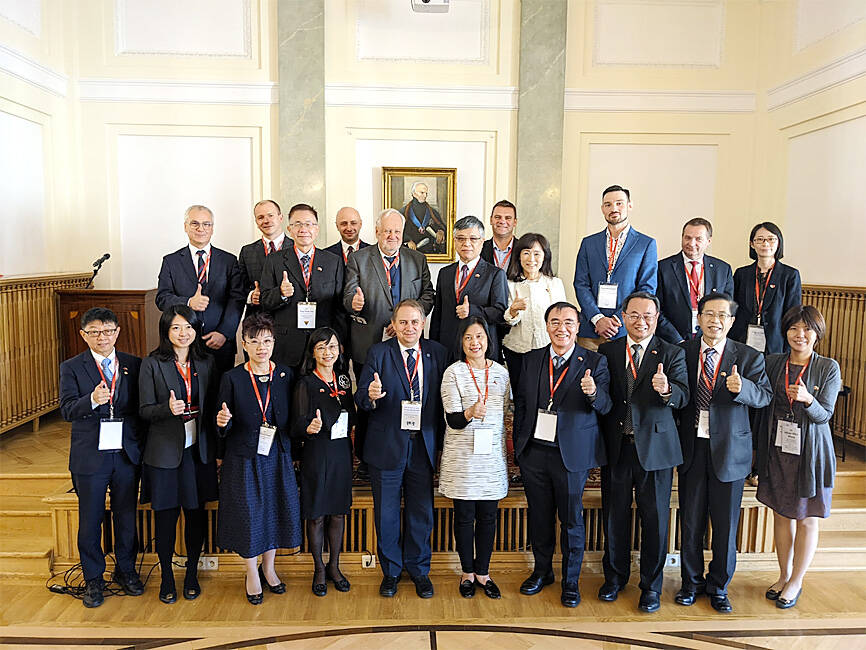A new scholarship covering tuition and living expenses is available for eligible Taiwanese students to pursue graduate degrees at public universities in Poland, the Ministry of Education (MOE) announced yesterday.
The scholarship, a collaboration with the Polish government, requires students to complete a one-year language training program in the central European country, before pursuing a graduate degree there for up to two years, the ministry said.
EDUCATION IN POLAND

Photo courtesy of the Ministry of Education
The scholarship, funded by the Polish Ministry of Science and Higher Education’s National Agency for Academic Exchange, is available to five students, said Lin Hsiao-ying (林曉瑩), the director of the MOE’s International and Cross-strait Education Department.
Selected students would pursue a language course at a center affiliated with a Polish public university from October to June next year, Lin said.
Tuition is waived and the Polish government would provide a monthly stipend of 1,800 zloty (US$449.55), she said.
The ministry would cover the cost of a round-trip economy-class flight from Taipei to Poland and provide an additional monthly stipend of NT$6,000, she said.
DEADLINE NEXT WEEK
After completing the language course, selected students must apply to a graduate program at a Polish public university for the 2026 academic year, Lin said.
Registration is open from now until Friday next week, she said, adding that interested students can apply to the ministry to obtain a recommendation from domestic universities.
Poland’s higher education system is thriving and has abundant resources and unique advantages compared with other European countries, she said.
It not only has a rich culture and history, but the cost of living in Poland is less than many other European countries, making it an attractive choice for international students, she said.
The scholarship targets students planning to pursue a graduate degree in Poland starting in the 2026 academic year.

‘DENIAL DEFENSE’: The US would increase its military presence with uncrewed ships, and submarines, while boosting defense in the Indo-Pacific, a Pete Hegseth memo said The US is reorienting its military strategy to focus primarily on deterring a potential Chinese invasion of Taiwan, a memo signed by US Secretary of Defense Pete Hegseth showed. The memo also called on Taiwan to increase its defense spending. The document, known as the “Interim National Defense Strategic Guidance,” was distributed this month and detailed the national defense plans of US President Donald Trump’s administration, an article in the Washington Post said on Saturday. It outlines how the US can prepare for a potential war with China and defend itself from threats in the “near abroad,” including Greenland and the Panama

A wild live dugong was found in Taiwan for the first time in 88 years, after it was accidentally caught by a fisher’s net on Tuesday in Yilan County’s Fenniaolin (粉鳥林). This is the first sighting of the species in Taiwan since 1937, having already been considered “extinct” in the country and considered as “vulnerable” by the International Union for Conservation of Nature. A fisher surnamed Chen (陳) went to Fenniaolin to collect the fish in his netting, but instead caught a 3m long, 500kg dugong. The fisher released the animal back into the wild, not realizing it was an endangered species at

The High Prosecutors’ Office yesterday withdrew an appeal against the acquittal of a former bank manager 22 years after his death, marking Taiwan’s first instance of prosecutors rendering posthumous justice to a wrongfully convicted defendant. Chu Ching-en (諸慶恩) — formerly a manager at the Taipei branch of BNP Paribas — was in 1999 accused by Weng Mao-chung (翁茂鍾), then-president of Chia Her Industrial Co, of forging a request for a fixed deposit of US$10 million by I-Hwa Industrial Co, a subsidiary of Chia Her, which was used as collateral. Chu was ruled not guilty in the first trial, but was found guilty

DEADLOCK: As the commission is unable to forum a quorum to review license renewal applications, the channel operators are not at fault and can air past their license date The National Communications Commission (NCC) yesterday said that the Public Television Service (PTS) and 36 other television and radio broadcasters could continue airing, despite the commission’s inability to meet a quorum to review their license renewal applications. The licenses of PTS and the other channels are set to expire between this month and June. The National Communications Commission Organization Act (國家通訊傳播委員會組織法) stipulates that the commission must meet the mandated quorum of four to hold a valid meeting. The seven-member commission currently has only three commissioners. “We have informed the channel operators of the progress we have made in reviewing their license renewal applications, and